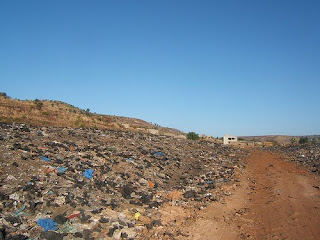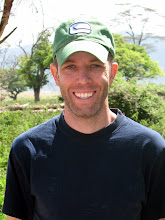Since coming back to the US around four months ago, my wife and I have been telling a lot of people why we decided to move back. Sometimes our explanation has been prompted by a direct question, but just as often we've told people so they get a sense of who we are and why we've made the decisions we've made. Most everyone seems to understand why we decided to move back, though I think they identify with certain reasons if they're expats, or other reasons if they've never lived overseas.
(I'm not going to try to order these according to importance.)
Being on the move
It only took a few months into our time in Kinshasa to realize that the expat crowd lives a very different life than most other people. When you work for an NGO or embassy or whatever, you get used to the idea that you're adopting a nomadic lifestyle. You'll spend two or three years at one post and then it's on to the next one. If you're a contractor or you split your time between home and working overseas, you live an even less stable life. You're always on the move, looking to the next post. Just today, I realized that most of the friends I have from Kinshasa have all left the city, and I moved there just over two years ago.
For my wife and I, we've reached a point in our lives where we don't want to be on the go for the next twenty years. We'd like to
be somewhere, to have a place where you build up real relationships, get used to your residence, and just have a sense of stability in your life. Don't get me wrong - it's fun and exciting to move to a new city and learn about the fun things to do, the layout of the streets and neighborhoods, where the good restaurants are located, and so on. But I think that with that it's hard to get a feeling that any place is truly "home." Even coming back to the states to visit, we see how much neighborhoods and people change and while our possessions and family were all still here while we were gone, things changed and that created some distance. The longer we stayed away, the greater that distance could potentially grow.
Building relationships
While overseas, one of the first questions asked when meeting someone new (besides "What are you doing here?" and "Where are you from, originally?") is "How long will you be here for?" The answers range from a few days to five years. There's all these overlapping timelines for people, where some are just ending their post in a city, others are in the middle of it, and some are just starting. It's hard to build friendships with people when it seems like every other person you meet is leaving the country in three months, or else you're leaving the country in three months.
Don't get me wrong - I made some really good friends while overseas and if one of them emailed me years from now to let me know that they would be in town, I'd happily let them stay at my house for as long as they wanted and I'd look forward to catching up. But that day-in day-out contact you have with others doesn't last very long when you're overseas. You have your time together, and that's it. Could be a week, could be a year. After that, each of you go on to new experiences and you don't necessarily have a lot in common besides the time you both spent together. I guess it's like the distance that grows between high-school classmates after a few years. Sure, you can laugh about stuff that happened in high school but who wants that to be all that their relationships stand on?
If nothing else, living life this way has taught me to value the time I do spend with people. Before living overseas, I'd always think that I'd see someone again next week, or the next time we played frisbee or whatever. Instead, I learned to enjoy the time I had with someone and take it for what it was, without necessarily planning on building a long-term friendship with them where I’d see them on a regular basis.
Working
My wife's work with ACME took us from Congo to Mali, and who knows where we would have gone next. There's no ACME post in Paris or Tokyo or Vancouver. ACME does most of their work in emergency situations or in impoverished countries. At some point, she would go to someplace like Haiti or Afghanistan or Chad. Life in these places is hard. Life in Kinshasa was hard, and it's tough to think about going to a place like that for your job and making it your home for a few years, and even tougher to think that most of the places you're going to live for the next twenty years are going to be like that. We were very fortunate to get a post in Mali. For ACME, that's considered a nice place to live.
On top of that, I would constantly be switching jobs. I was very fortunate to find work in Kinshasa after only being there a month. In Mali, I never really found a good full-time position, let alone a full-time position that matched my education, career background, and interests. At our next post, who knows what I would have found? It's stressful being out of work, and it's even harder being out of work in a place where jobs are hard to come by because you're an outsider.
Life in a developing country
Make no mistake, living in a developing country is exciting. It's also very hard at times. Power and water outages, weird diseases, lack of conveniences that many of us take for granted (like fast internet), polluted air and water, dishonest government and authority figures, and language barriers are some of the things you deal with on a daily basis. While it's thrilling to tell someone I had an intestinal parasite, it's no joy to go through the pain of living with it for four days or wonder if it will come back again sometime. When the power goes out for hours at a time and you can't sleep because of the heat and you're wondering if all the food in your fridge will go bad, it's not quaint.
My wife suffered from a continual barrage of illnesses and maladies during our two years in Africa. None of them were life-threatening (well, except for the two cases of malaria and her bout with typhoid), but she was sick of being sick once a month. Even more than that, it was hard to come down with some mysterious illness and know that if we were in a city with a better-equipped medical facility, a simple test could tell us what was going on. Instead, we had to rely on the best guesses of a local doctor or else fly to South Africa or Europe for further testing.
The expat bubble
As an expat, you life a life which is very much apart from the rest of the population around you. We lived in a nice house with a big wall around it and a gate, at and the end of the day we would drive our white SUV though the gates, close them up, and that would be it. We hung out with other Americans or Europeans. We watched American movies and TV shows, craved chocolate chips and Doritos, and went back the US to visit our friends and family.
Even though we had Malian and Congolese friends, we were never going to become part of their culture. It was cool to learn about what they found funny or meaningful, and on a human level you can relate with almost anyone. When it came down to it, though, we would never fully fit in with the population around us. Especially if we were moving every two or three years, there's no way it could happen. By the time you just start leaning the local language and customs, you're off to some other part of the world that's completely different.
And so, we hung out with other expats. We shopped at the same stores, went to the same parties, discussed the same things. I met lots of really fascinating expats who had amazing backgrounds. But again, they're all coming and going and just about everyone has their eye on their next post or is talking about the post they just came from. It gets wearisome.
The further you get
When we looked at most all of the points above, we realized that the longer we spent overseas, the harder it would be for us to come back. It could be hard to find work if you’ve spent the last twenty years working overseas. Not being a part of your home culture makes it hard to relate when you do return. Some distance can develop between you and your friends and family. My wife and I looked down the road and decided that this was not the kind of life we wanted to have when we were in our forties and fifties. We wanted a place of our own, a regular circle of friends and co-workers, some peace in knowing that we had decent medical care if we needed it, and so on.
And so, we're back. We moved to Denver, found work and a place to live, and we're getting used to the idea of being in Denver for more than the next 24 months. Although we both miss Africa in different ways, we're both happy with our decision to return.





















